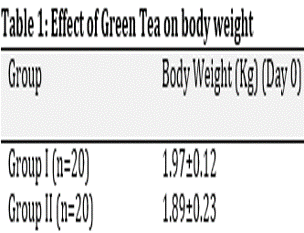Abstract
Obesity has been linked with several comorbidities like cardiovascular disorders, diabetes, and hypertension. Weight reduction is directly associated with the consumption of green tea. So, with this premise of background, we evaluated the potential of green tea consumption on obesity and serum lipid profiles in both normo- and hyper-cholesterol emic rabbits. Sixty New Zealand white rabbits (age: 6-8 months; weight 1.5-2 kg) were used for this experiment. Rabbits were randomized and equally divided into three different groups. Group I (control group) received 10 ml/kg of distilled water twice daily, Group II received high cholesterol diet twice daily, and Group III received high cholesterol diet along with green tea solution 10 ml/kg, twice daily for 90 days. Weight measurements and serum analysis were conducted on Day 0 and day 90. For the obtained data, SPSS analysis was performed (SPSS 21). A significant increment of body weight was observed in control (1.97 ± 0.12 vs 2.87 ± 0.21, p<0.0001) and high cholesterol groups (1.91 ± 0.23 vs 3.13 ± 0.31, p<0.0001) at Day 90 when compared with Day 0. Though the results were not significant, there was a reduction in the body weight in the green tea group (2.20 ± 1.47 vs 1.72 ± 0.22) at Day 90 when compared with Day 0. Consumption of green tea for 90 days resulted in weight loss and inhibition of the increase in the levels of TC, LDL, and VLDL. So, green tea can act as a natural food supplement for the management of obesity and dyslipidemia.
Full text article
Authors

This work is licensed under a Creative Commons Attribution-NonCommercial-NoDerivatives 4.0 International License.

